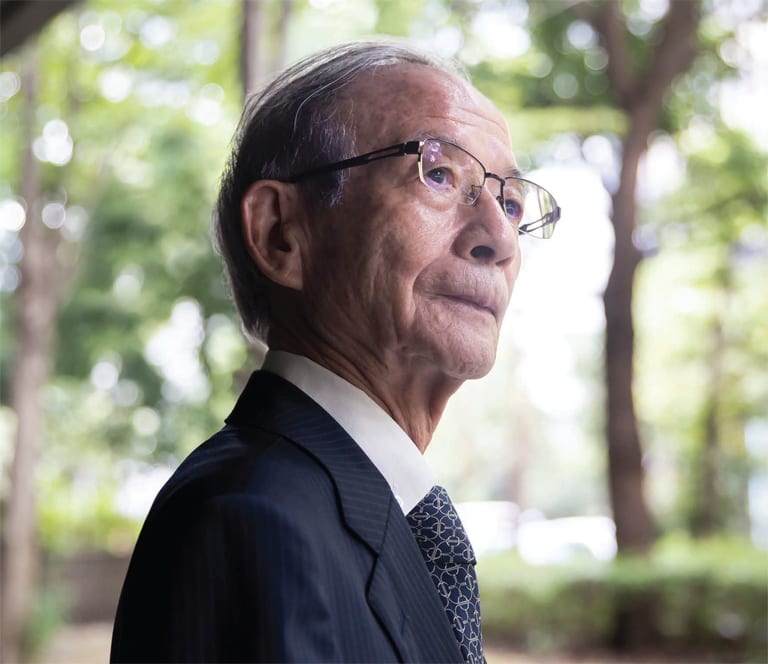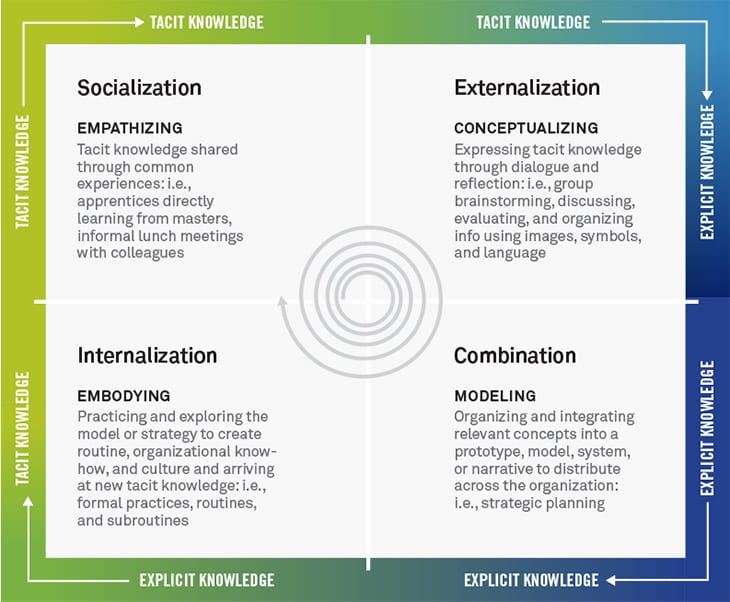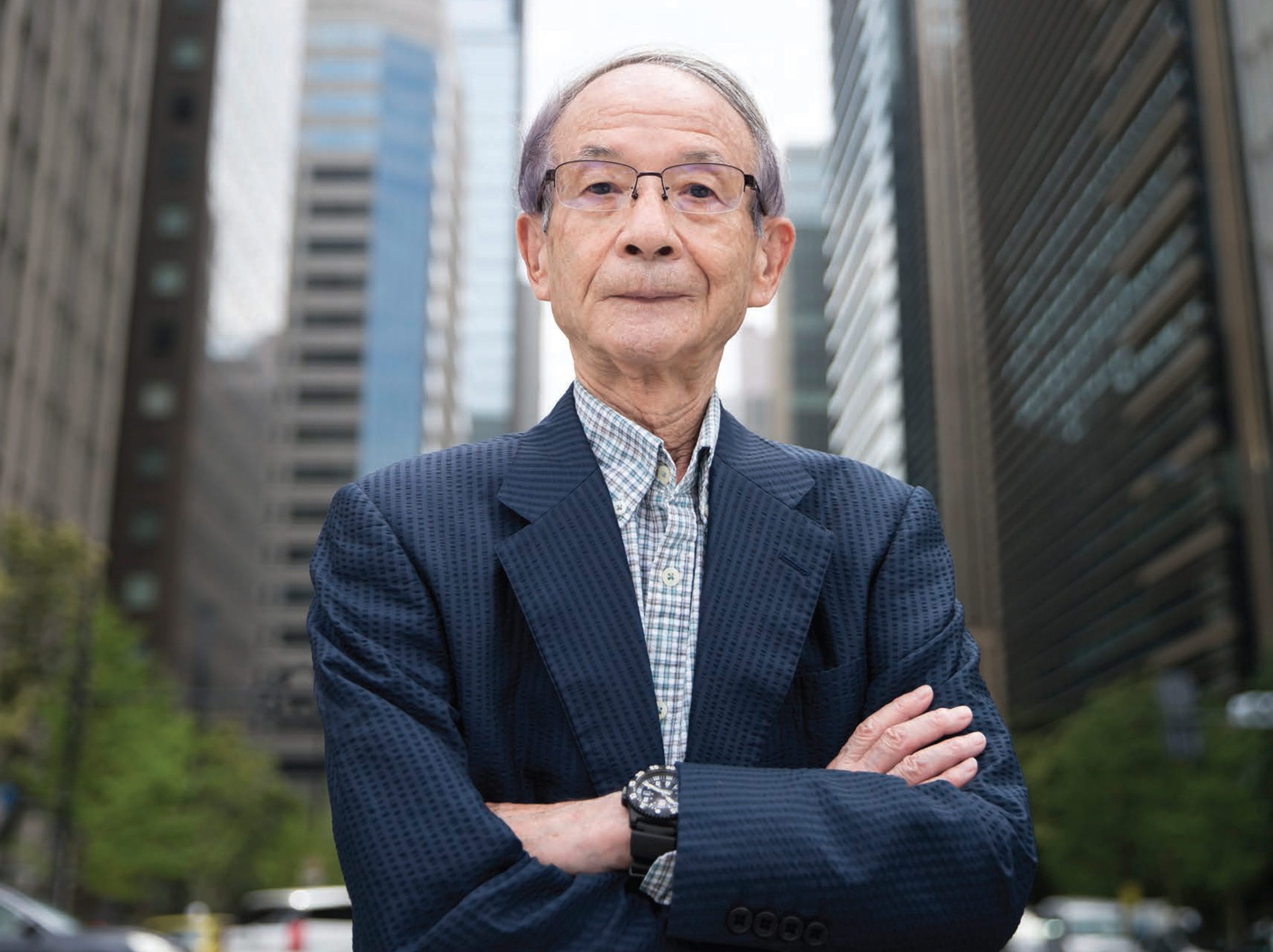Knowledge-management pioneer Ikujiro Nonaka, MBA 68, PhD 72, has transformed how people drive innovation together
When Ikujiro Nonaka first came to UC Berkeley’s business school to study marketing in 1965, he barely spoke English. His advisor, Professor Francesco Nicosia, suggested he read Hemingway. “I wondered, ‘Why Hemingway?’” Nonaka recalls. “Later, I realized that Hemingway’s writing style—simple, direct, and unadorned— was the essence of academic writing. I ended up spending a good chunk of time reading Hemingway’s short stories.”
Nonaka has come a long way since “The Snows of Kilimanjaro” and “Hills Like White Elephants.” One of the world’s top theorists in the field of knowledge management, he writes in a style that is clear and direct, to be sure, but also philosophical and profound, pioneering theories about the key role that knowledge management plays in fostering innovation. Before Nonaka, companies looked at information as a commodity that could be neatly codified and transmitted; he, instead, envisioned knowledge as a living and breathing entity that had to be shared between workers to reach its full potential. If not the creator of the field of knowledge management, he is its intellectual father and one of its greatest philosophers.
For his accomplishments, Nonaka will be celebrated on November 3 with a Lifetime Achievement Award from Berkeley Haas, only the fifth person to receive the honor and the first academic. Haas Dean Rich Lyons, BS 82, calls Nonaka’s impact on the business world a lasting one. “Applying a humanistic lens and practical wisdom to his research,” Lyons says, “he has developed new frameworks for how organizations can transcend simply managing data to using the knowledge within their organizations to create better outcomes.”
Nonaka’s close friend and colleague David J. Teece, the Thomas W. Tusher Professor in Global Business and Faculty Director of the Tusher Center for the Management of Intellectual Capital, says the Lifetime Achievement honor speaks to Nonaka’s ability to translate esoteric theories into practical knowledge. “This award is a recognition that intellectual ideas and management practice really do live together,” he says.
FROM EAST TO WEST
Nonaka’s breakthrough came with the publication in 1994 of “A Dynamic Theory of Organizational Knowledge Creation,” in Organization Science. The article helped establish the field of knowledge management as a discipline. Nonaka and Hirotaka Takeuchi, MBA 71, PhD 77, an alumnus turned Harvard Business School Professor, followed up in 1995 with the book The Knowledge-Creating Company: How Japanese Companies Create the Dynamics of Innovation, which remains a highly influential business book for its explanation of the role that Japanese philosophy could contribute to Western business. Central to their thesis was that knowledge gave companies competitive advantage and that knowledge was contained within a company’s people—a holistic vision that over the years has come to infuse business in the U.S. and Europe.
Ironically, when Nonaka first came to Haas, it was with an eye toward the opposite: bringing Western business ideas to Japan. “In my eyes, Japan’s own management style at the time was already getting quite outdated,” he says. “I noticed that most new theories and methods were coming from the U.S.” He became interested in American theories of management while working nine years for Fuji Electric, beginning on the factory floor and moving up to various roles in human resources, marketing, and finance. Fearing an upcoming crisis in Japanese industry, he attended an American business school to help his home country remain competitive and “win” the global war of capitalism.

Nonaka appreciated Berkeley’s focus on a theoretical approach to management rather than using case studies. He is fond of calling Berkeley “the Athens of the Pacific,” crediting that philosophical approach to much of his later work. “Attending Berkeley helped me to build a great academic foundation—especially a theoretical one,” he says.
Under his advisor Nicosia, Nonaka used an information- processing model to study how customers make decisions, supplementing it with courses in sociology with Neil Smelser and Arthur Stinchcombe. After graduation, he returned to Japan and taught at Nanzan University and later at the National Defense Academy. In 1982, he took an appointment at Hitotsubashi University outside the city part of Tokyo where, along with Takeuchi, he began researching innovation at Japanese companies including Fuji, Xerox, Honda, and Canon. In return visits to Berkeley as a visiting scholar, he bonded with Prof. Teece, who had a long-standing interest in innovation and business strategy. They co-taught UC Berkeley Executive Education courses for Japanese companies in Japan and the U.S. They also shared common ideas and research interests.
DECIPHERING JAPANESE BUSINESS
Nonaka found that the information-processing model he had learned couldn’t fully account for the operations of Japanese companies, which saw business as more than just processing information inputs and outputs. “The managers of Japanese companies I studied viewed management as a way of life, not just as a way to maximize profits,” he says. Nonaka first proposed the concept of “information creation” to explain how they operated, but that too seemed inadequate.
“I believe we are at a time when the business world and society need more ideas and practices of ‘human-centric’ management.”
—Ikujiro Nonaka, MBA 68,
PhD 72
By 1984, Nonaka realized that what was important was not information, but knowledge. “Unlike information, which is an objective property, knowledge is about subjective belief, meaning, and value and is created through social interaction,” he says.
Using their research on Japanese companies, Nonaka and Takeuchi famously described the process of product development in Japan as “rugby not relay.” “In Western companies, people pass the baton back and forth between each other,” says Takeuchi. “But in Japan, they use a scrum, passing the ball back and forth to each other as they move down the field together.”
Nonaka shifted his focus to how knowledge is created socially within firms, reading ancient and contemporary philosophy, particularly focusing on the writings of Hungarian philosopher Michael Polanyi, who distinguished between the idea of “explicit knowledge,” which can be captured in language and figures, and “tacit knowledge,” which is tied to the body, senses, intuition, and past experiences.
Haas Adjunct Professor Henry Chesbrough, PhD 97, the faculty director of the Garwood Center for Corporate Innovation, counts Nonaka among his mentors and likens tacit knowledge to that of a chef in a restaurant versus the explicit knowledge contained in a recipe. “You can make a dish at home, but it doesn’t quite come out the same way,” he explains.
BREAD AND KNOWLEDGE
Nonaka made the explicit and tacit knowledge distinction the centerpiece of a 1991 Harvard Business Review article co-written with Takeuchi, “The Knowledge-Creating Company,” in which he argued that only by a sharing of both tacit and explicit knowledge by individuals can innovation occur. As one example, he used Matsushita Electric’s attempt to build a home bread-making machine. Despite months of scientific analysis, engineers were unable to get the machine to knead the dough correctly. It was only after one designer observed an experienced bread maker and the way she intuitively kneaded the bread (and turned this understanding into a mathematical model) that they were able to solve the problem.
When the article came out, it caused a sensation. “Part of the alchemy he performed was to transform a very old idea of knowledge into something that was much more relevant and practical and valuable today,” says Chesbrough. “He looked at how knowledge was created but also how it was transmitted and acted upon within organizations.” Indeed, Nonaka’s article inspired the concept of creating spaces for designers and developers to rub elbows together outside of traditional teams—a standard practice in innovative companies today.
Nonaka enlisted Takeuchi to further expand ideas about knowledge creation in The Knowledge-Creating Company. The book won the 1995 Best New Book of the Year for business from the Association of American Publishers and was for years Oxford University Press’ top-selling business title. Based on Nonaka’s 1994 Organization Science article, “A Dynamic Theory of Organizational Knowledge Creation,” Nonaka and Takeuchi crystalized their ideas about tacit and explicit knowledge into a framework for innovation they called the SECI model—Socialization, Externalization, Combination, and Internalization—to describe the spiral through which knowledge moved from outside and within a company. (See model below.)
Crucial to their hypothesis was the importance of middle managers. At a time when many U.S. companies were downsizing and laying off middle managers as a cost-cutting measure, Nonaka defended them as crucial to the knowledge process, serving as a conduit between the vision of top executives and the realities faced by front-line workers. “In our notion of middle- up-down management, top management creates the vision and core values of the company and plays a benevolent dictator role, but middle management creates concrete concepts that front-line workers can understand,” says Nonaka. “Therefore, the role of middle managers is to facilitate the knowledge-creation process rather than dictate and use their authority to control front-line workers.”
A LIFE RECOGNIZED
Over the years, Nonaka has continued to introduce new philosophical concepts to help explain and facilitate the flow of knowledge within organizations. One of the most important—and difficult to translate— is the concept of ba, a term he appropriated from Japanese philosopher Kitar. Nishida, which means a shared space that allows a community to share context and create knowledge. “It is a temporary container for creative interaction,” Nonaka says. “The space could be physical, virtual, mental, or any combination of them, and it emerges and disappears in real time.” Nonaka first presented this concept with Noboru Konno in a 1998 article in California Management Review.
By working to create ba, an organization helps its members work toward a shared purpose and transfer tacit knowledge. “Through empathy and sympathy, these people understand the subjectivity of others and share experience, which spurs the creation of new knowledge,” Nonaka says. The idea is widely spread in Japan. The concept is featured in the Nikkei New Office Award, an accolade that spreads and promotes “comfortable and functional” offices to improve knowledge creation at workplaces. The award has 30 years of history and has been supported by Japan’s Ministry of Economy, Trade, and Industry.
Notable among academics, Nonaka remained on the boards of several leading Japanese companies for many years, where he had a close-up view of how knowledge and innovation interact within companies. Beyond the realm of private enterprise, a Japanese government organization incorporates his ideas in its organizational and leadership development programs for the governments of Asian countries as well. He has also continued to be active at Berkeley Haas. In 1997, Fuji Xerox and Xerox together endowed the $1 million Xerox Distinguished Professorship in Knowledge, making Nonaka the first professor in the world dedicated to the study of knowledge management.
For five years after that appointment, he and Teece hosted a Forum on Knowledge and the Firm, which helped to spread the ideas of knowledge management worldwide. At the same time, the two taught a seminar on knowledge management. Since then, Nonaka has continued to visit Berkeley Haas regularly and to facilitate exchanges of students to Japan to study Japanese management philosophy.

Along the way, Nonaka has been honored in both the East and West. In 2013, he was one of the first 10 management leaders to be inducted into the Thinkers50 Hall of Fame by the prestigious London-based ranking organization. In Japan, Nonaka has earned a Purple Medal of Honor from the government for his contribution to academia and delivered an Imperial New Year’s Lecture by invite of the Emperor of Japan—the first-ever business professor asked to do so.
Now 82, Nonaka continues to push forward philosophically based new ideas to help improve the ability of businesses to function. One of his most recent concepts is phronesis, a term Aristotle used to connote wisdom devoted to practical purposes. Nonaka, Ryoko Toyama, and Toru Hirata introduced it in the 2008 book Managing Flow as well as Nonaka and Takeuchi in the 2011 Harvard Business Review article “The Wise Leader.” In it, they argue that phronesis, rather than mere intelligence of leadership, is essential for synthesizing the increasing complexity of social and economic forces in today’s society. “Phronetic leaders have the ability to dynamically balance between two seemingly irreconcilable ways of thinking or concepts—such as science and humanity, objectivity and subjectivity, and idealism and pragmatism—and apply them to particular contexts,” Nonaka says.
As Nonaka has evolved in his thinking from information to knowledge to wisdom, he increasingly pushed for a more humane form of leadership that uses unique human capacities to innovate for the good of society. “I believe we are at a time when the business world and society need more ideas and practices of ‘human-centric’ management,” he says. “I hope that I have made some contribution to pushing and promoting that idea.”
Given where he started, coming to Berkeley with almost no English and with a patriotic view of helping Japan compete, he says, “it is absolutely beyond my imagination that I am receiving this award from Berkeley Haas.” Even after a lifetime of achievement, however, he remains a student always, not about to rest on these laurels. “With all the humbling thoughts and gratitude in mind, I do not take this award as the last stop but rather as a step forward to take another jump.”
